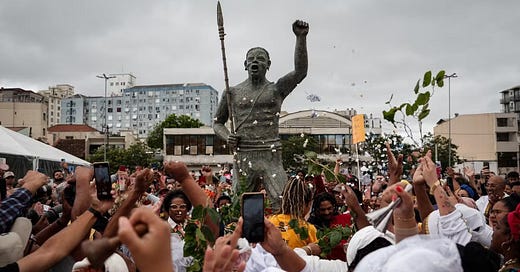Brazil's New National Holiday: Black Consciousness Day
After 51 years of mobilization from Afro-Brazilian movements, November 20 designated national holiday in remembrance of Zumbi dos Palmares
In 1973, a group of Afro-Brazilian rights activists in Porto Alegre and São Leopoldo, Rio Grande do Sul, began pressuring authorities to designate November 20 as a national holiday. Brazil already had a national holiday commemorating the eradication of slavery (May 13), but to Afro-Brazilian rights movements, the fact that Brazil was the last country in the Western hemisphere to outlaw slavery, in 1889, was nothing to celebrate. Instead, they fought for establishment of a national day of black consciousness in memory of Zumbi, the greatest leader of an independent nation of formerly enslaved people called Palmares which existed on the edge of the colonial province of Pernambuco from the late 1500s to 1710. The movement to declare November 20 a holiday spread across the country and, as the years passed, more and more cities declared it a municipal holiday. This year, after a bill passed in Congress, President Lula sanctioned the date as a Federal holiday. On the first National Day of Black Consciousness, dozens of capoiera martial arts groups came out to celebrate on Old Recife Island, highlighting the role that capoeira has had over the centuries preserving Zumbi’s memory as a hero of resistance. This is my story on it for TeleSur English. After the video, I’ll post the transcript.
Transcript:
Narrator: In 1973, a group of Afro-Brazilian rights activists in Porto Alegre began fighting to establish November 20th as National Black Consciousness day, in honor of Zumbi dos Palmares, leader of a nation of formerly enslaved people which lasted for almost 100 years during the 17th Century in the colonial province of Pernambuco. This year, President Lula signed a law declaring it a national holiday.
Professor Cabral - Capoeirista: This is a very important date because we have been fighting for years for a holiday that commemorates black consciousness day and the importance of the capoeira movement within black consciousness. It's really important.
Narrator: During Palmares' height, it's largest town, Cerca Real do Macaco, had a population almost as large as that of Rio de Janeiro. But it's wealth began to anger the Portuguese, and, after decades of unsuccessful attacks, a group of mercenaries ambushed and killed Zumbi in 1695, transforming him into a martyr, with his legend carried through the generations in the songs of practitioners of the Afro-Brazilian martial art of capoeira.
Mestre Peu - Capoeira Master: Zumbi of Palmares has great importance for us because its said that he was a great leader and that he created this movement called capoeira. As the story goes, people from several different African nations lived in Palmares like Ketu, Mozambique and Angola, so he invited the best fighters from each nation and unified their fighting styles as one.
Narrator: Like Palmares, capoeira has become an important symbol of resistance in Brazil, as attempts made to destroy it over the centuries by the government and Christian churches have all failed.
Henrique Kohl - Capoeirista and Physical Education Professor at the Pernambuco Federal Univerity: Capoeira embraces the story of Zumbi of Palmares in the context of the representivity of November 20th, the day that Zumbi of Palmares was assassinated, killed after a long period of resistance. Since capoeira is also a form of resistance and struggle in the broad sense, we are here in Pernambuco for the annual march for Zumbi of Palmares.
Narrator: According to Globo News, over 1500 public events were held across Brazil this November 20th to commemorate the new Federal holiday.
Brian Mier, TeleSur, Recife




